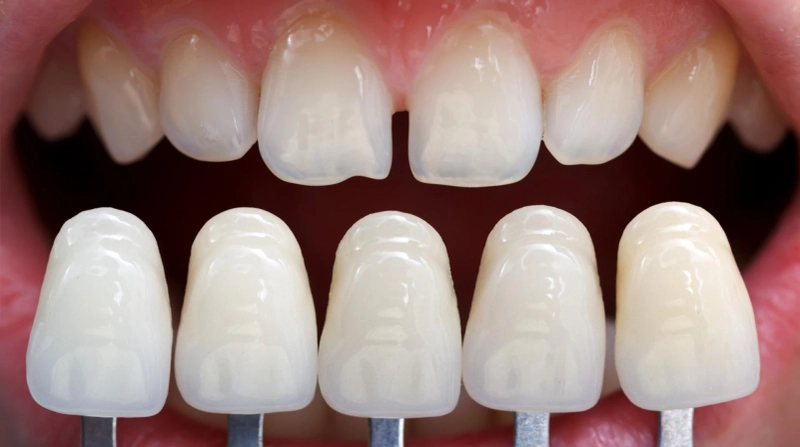Veneers are an increasingly popular cosmetic dental treatment that can enhance the appearance of the teeth and provide a range of benefits, from improving self-confidence to restoring oral health.
If you're considering veneers in London, Ontario. it's important to understand the treatment process, the types of veneers available, and the benefits they offer.
What Are Veneers?
Veneers are thin, custom-made shells placed on the teeth' front surface. They are typically made of porcelain or composite resin and can address various cosmetic and functional issues, from stained or discolored teeth to chipped or misshapen teeth.
Types Of Veneers
There are two main types of veneers available:
Porcelain Veneers:
Porcelain veneers are the most common type of veneer. They are custom-made in a dental laboratory and bonded to the teeth with a special dental adhesive.
Porcelain veneers are more durable and long-lasting than composite veneers and offer a more natural look and feel.
Composite Veneers:
Composite veneers are made of a tooth-colored resin material applied directly to the teeth and shaped to fit the desired size and shape.
Composite veneers are less expensive than porcelain veneers and can be completed in a single office visit, but they are shorter and may require more maintenance over time.
Benefits Of Veneers
Veneers offer a range of benefits for patients seeking to improve their oral health and appearance, including:
Improved Appearance: Veneers can help improve the color, shape, and alignment of the teeth, resulting in a more attractive and confident smile.Minimal Tooth Reduction: Veneers require minimal tooth reduction, making them a less invasive option than other cosmetic dental treatments.Durability: Porcelain veneers are durable and long-lasting, with a lifespan of 10-15 years or more, with proper care.Improved Oral Health: Veneers can improve oral health by covering and protecting damaged or weakened teeth, reducing the risk of decay and other dental problems.Facts About Veneers
A variety of faults can be corrected with dental veneers Dental veneers can address a number of problems, such as:
The reduction of tooth sensitivityDefending the enamel from harm (or further damage)The reshaping and enhancement of your teeth's lookExtending crooked teethRepairing a cracked or chipped toothRepairing a cracked or chipped tooth Dental veneers can be created from composite or porcelain materials. Both materials are the same color as a natural tooth, are extremely durable, and endure for years.
The material that a dentist uses is often determined by the tooth that needs to be covered.
Dental veneers provide a natural appearance. Dental veneers are made of tooth-colored material, which by nature mixes in remarkably well with genuine teeth.
As a result, veneers can be used to conceal worn-down enamel that has caused a tooth to become discolored, albeit a teeth cleaning procedure may be necessary prior to placing the dental veneers.
Dental veneers are made specifically for you to meet your demands. Dental veneers vary widely from one another. In actuality, every dental veneer is distinct and specially made depending on why it is being used.
For safety, some dental veneers could be thicker. When utilized to lengthen a short or damaged tooth, the dental veneer in some situations may be longer.
The Veneers Procedure
The veneers procedure typically involves several steps, including:
Consultation: The first step is a consultation with a dentist or cosmetic dentist. The dentist will assess the patient's oral health and discuss treatment options.Preparation: The next step is to prepare the teeth for the veneers. This may involve removing a small amount of enamel from the front of the teeth to create space for the veneers.Impressions: After the teeth are prepared, the dentist will take impressions of the teeth and send them to a dental laboratory to create the veneers.Temporary Veneers: While the permanent veneers are being made, the patient may receive temporary veneers to protect the teeth and maintain normal function.Fitting: Once the permanent veneers are ready, the dentist will fit the veneers and make any necessary adjustments.Follow-Up: The patient will be instructed on how to care for the veneers and may need to schedule follow-up appointments to ensure the veneers are functioning properly.Care And Maintenance Of Veneers
Veneers require regular care and maintenance to ensure their longevity and effectiveness.
Some tips for caring for veneers include:
Brushing and Flossing: Regular brushing and flossing are essential to maintaining good oral hygiene and preventing decay and gum disease.Avoid Hard or Sticky Foods: Hard or sticky foods can damage or dislodge veneers, so it is important to avoid them as much as possible.Avoid Teeth Grinding: Teeth grinding can also damage veneers, so patients who grind their teeth may need to wear a protective mouthguard at night.

